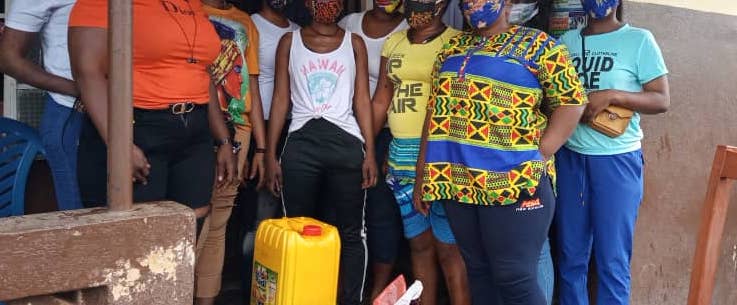Fatmata*1 is a chairlady of commercial sex workers in one of Sierra Leone’s brothels. According to Fatmata*, COVID-19 regulations, especially imposed curfews, made her and other CSWs’ lives even more vulnerable and precarious.
To enforce curfews, Sierra Leone Police were frequently raiding and arresting CSWs. These women were detained if they could not pay or offer sexual favors to secure their release. Fatmata complained that the police were very hostile to them when enforcing curfew hours. Additionally, because clients fear exposure to the virus, there’s been a significant decrease in business. Fewer clients and reduced operating hours make it difficult for them to continue to provide for themselves and their families.
Our experience during Ebola showed that existing harassment by police officers, like those experienced by Fatmata and other CSWs, can often be exacerbated during national crises.
Recognizing this, we have continued to work with CSWs and ensure that our advocacy and legal work addresses the challenges they are facing.
Fatmata refers to us as the “Wi Kombra organization that cares for us” or our mother organisation that cares for us.

Some ways in which CSWs have been affected by COVID-19*2:
|
1. Exacerbating existing inequalities and injustice: Many sex workers face a complicated web of discrimination because, in addition to being sex workers, they belong to other marginalised groups: they are often women, people living with disabilities or HIV, LGBTQ, etc. 2. Targets of law enforcement: Sex workers were often profiled and targeted by law enforcement. The increased risk of arrest during lockdowns place sex workers at particular risk of imprisonment, where conditions of detention could increase their risk of infection. 3. Severe loss of income: Closures of workplaces, lockdowns, self-isolation, travel restrictions and curfew mean that many sex workers have lost most, if not all of their income. Many sex workers are unable to access basic necessities, such as food, shelter or clean water. 4. Increased risk of COVID-19 transmission: Most jobs in the sex industry require close in-person gatherings and physical intimacy, making it easy for the virus to be transmitted 5. Increased vulnerability: Some clients are using this time of increased insecurity to bargain down prices and demand riskier services, such as or kissing and other face-to-face activities |
*1 Name changed to protect her identity
*2 Mama Cash, Count Sex Workers In! Campaign
https://www.mamacash.org/en/counting-sex-workers-in-campaign
